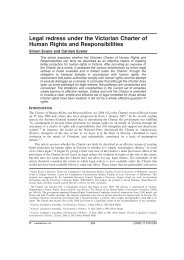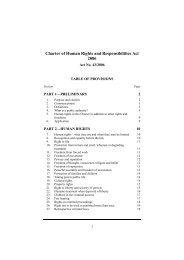The Impact of the Corporate Form on Corporate Liability for ...
The Impact of the Corporate Form on Corporate Liability for ...
The Impact of the Corporate Form on Corporate Liability for ...
Create successful ePaper yourself
Turn your PDF publications into a flip-book with our unique Google optimized e-Paper software.
were treated as <str<strong>on</strong>g>the</str<strong>on</strong>g> pr<str<strong>on</strong>g>of</str<strong>on</strong>g>its <str<strong>on</strong>g>of</str<strong>on</strong>g> <str<strong>on</strong>g>the</str<strong>on</strong>g> parent company, <str<strong>on</strong>g>the</str<strong>on</strong>g> parent company appointed <str<strong>on</strong>g>the</str<strong>on</strong>g><br />
managers <str<strong>on</strong>g>of</str<strong>on</strong>g> <str<strong>on</strong>g>the</str<strong>on</strong>g> business and <str<strong>on</strong>g>the</str<strong>on</strong>g> parent company stayed in c<strong>on</strong>trol <str<strong>on</strong>g>of</str<strong>on</strong>g> <str<strong>on</strong>g>the</str<strong>on</strong>g> business.<br />
When <str<strong>on</strong>g>the</str<strong>on</strong>g> local council tried to compulsorily acquire <str<strong>on</strong>g>the</str<strong>on</strong>g> waste business, <str<strong>on</strong>g>the</str<strong>on</strong>g> parent<br />
company claimed <str<strong>on</strong>g>the</str<strong>on</strong>g> waste business as its own, ra<str<strong>on</strong>g>the</str<strong>on</strong>g>r than <str<strong>on</strong>g>the</str<strong>on</strong>g> business <str<strong>on</strong>g>of</str<strong>on</strong>g> <str<strong>on</strong>g>the</str<strong>on</strong>g> subsidiary<br />
and claimed compensati<strong>on</strong> <strong>for</strong> disturbance <str<strong>on</strong>g>of</str<strong>on</strong>g> its business.<br />
120. <str<strong>on</strong>g>The</str<strong>on</strong>g> court held <str<strong>on</strong>g>the</str<strong>on</strong>g> subsidiary was carrying <strong>on</strong> business as <str<strong>on</strong>g>the</str<strong>on</strong>g> parent company and<br />
<str<strong>on</strong>g>the</str<strong>on</strong>g>re<strong>for</strong>e pierced <str<strong>on</strong>g>the</str<strong>on</strong>g> corporate veil. In that case <str<strong>on</strong>g>the</str<strong>on</strong>g> court stated that it is a questi<strong>on</strong> <str<strong>on</strong>g>of</str<strong>on</strong>g> fact<br />
in each case whe<str<strong>on</strong>g>the</str<strong>on</strong>g>r <str<strong>on</strong>g>the</str<strong>on</strong>g> subsidiary was carrying <strong>on</strong> its business as its own, or whe<str<strong>on</strong>g>the</str<strong>on</strong>g>r it<br />
was carrying <strong>on</strong> <str<strong>on</strong>g>the</str<strong>on</strong>g> business as <str<strong>on</strong>g>the</str<strong>on</strong>g> business <str<strong>on</strong>g>of</str<strong>on</strong>g> <str<strong>on</strong>g>the</str<strong>on</strong>g> parent company. Fur<str<strong>on</strong>g>the</str<strong>on</strong>g>r, Atkins<strong>on</strong> J<br />
went <strong>on</strong> to state six factors relevant <strong>for</strong> <str<strong>on</strong>g>the</str<strong>on</strong>g> determinati<strong>on</strong> <str<strong>on</strong>g>of</str<strong>on</strong>g> that questi<strong>on</strong> <str<strong>on</strong>g>of</str<strong>on</strong>g> fact:<br />
(a)<br />
(b)<br />
(c)<br />
(d)<br />
(e)<br />
(f)<br />
Were <str<strong>on</strong>g>the</str<strong>on</strong>g> pr<str<strong>on</strong>g>of</str<strong>on</strong>g>its treated as <str<strong>on</strong>g>the</str<strong>on</strong>g> pr<str<strong>on</strong>g>of</str<strong>on</strong>g>its <str<strong>on</strong>g>of</str<strong>on</strong>g> <str<strong>on</strong>g>the</str<strong>on</strong>g> parent company?<br />
Was <str<strong>on</strong>g>the</str<strong>on</strong>g> pers<strong>on</strong> c<strong>on</strong>ducting <str<strong>on</strong>g>the</str<strong>on</strong>g> business appointed by <str<strong>on</strong>g>the</str<strong>on</strong>g> parent company?<br />
Was <str<strong>on</strong>g>the</str<strong>on</strong>g> parent company <str<strong>on</strong>g>the</str<strong>on</strong>g> head and <str<strong>on</strong>g>the</str<strong>on</strong>g> brain <str<strong>on</strong>g>of</str<strong>on</strong>g> <str<strong>on</strong>g>the</str<strong>on</strong>g> trading venture?<br />
Did <str<strong>on</strong>g>the</str<strong>on</strong>g> parent company govern <str<strong>on</strong>g>the</str<strong>on</strong>g> venture, decide what should be d<strong>on</strong>e and what<br />
capital should be embarked <strong>on</strong> <str<strong>on</strong>g>the</str<strong>on</strong>g> venture?<br />
Did <str<strong>on</strong>g>the</str<strong>on</strong>g> parent company make <str<strong>on</strong>g>the</str<strong>on</strong>g> pr<str<strong>on</strong>g>of</str<strong>on</strong>g>its by its skill and directi<strong>on</strong>?<br />
Was <str<strong>on</strong>g>the</str<strong>on</strong>g> parent company in effectual and c<strong>on</strong>stant c<strong>on</strong>trol?<br />
121. <str<strong>on</strong>g>The</str<strong>on</strong>g> facts <str<strong>on</strong>g>of</str<strong>on</strong>g> Smith St<strong>on</strong>e and Knight are so extreme, in that <str<strong>on</strong>g>the</str<strong>on</strong>g> parent company exercised<br />
so much c<strong>on</strong>trol over subsidiary company, as to make it an uneasy basis <str<strong>on</strong>g>of</str<strong>on</strong>g> principle. 93<br />
N<strong>on</strong>e<str<strong>on</strong>g>the</str<strong>on</strong>g>less, it has been followed in a number <str<strong>on</strong>g>of</str<strong>on</strong>g> Australian cases. 94<br />
122. Similarly, where a parent company does not properly resource its subsidiary, such that <str<strong>on</strong>g>the</str<strong>on</strong>g><br />
subsidiary cannot operate as an independent entity, <str<strong>on</strong>g>the</str<strong>on</strong>g> subsidiary may be held to be<br />
acting as an agent <str<strong>on</strong>g>of</str<strong>on</strong>g> <str<strong>on</strong>g>the</str<strong>on</strong>g> parent. 95 This was <str<strong>on</strong>g>the</str<strong>on</strong>g> case in Smith, St<strong>on</strong>e and Knight, where<br />
although <str<strong>on</strong>g>the</str<strong>on</strong>g> subsidiary company ostensibly ran <str<strong>on</strong>g>the</str<strong>on</strong>g> business, in fact <str<strong>on</strong>g>the</str<strong>on</strong>g> parent company<br />
had not transferred <str<strong>on</strong>g>the</str<strong>on</strong>g> business to <str<strong>on</strong>g>the</str<strong>on</strong>g> subsidiary and <str<strong>on</strong>g>the</str<strong>on</strong>g> subsidiary did not have any<br />
resources. It c<strong>on</strong>ducted <str<strong>on</strong>g>the</str<strong>on</strong>g> business in questi<strong>on</strong> in name <strong>on</strong>ly.<br />
123. In DHN Distributors v L<strong>on</strong>d<strong>on</strong> Borough Council Tower Hamlets [1976] 3 All ER 462, <str<strong>on</strong>g>the</str<strong>on</strong>g><br />
Court <str<strong>on</strong>g>of</str<strong>on</strong>g> Appeal followed <str<strong>on</strong>g>the</str<strong>on</strong>g> decisi<strong>on</strong> in Smith, St<strong>on</strong>e and Knight, but expanded its<br />
applicati<strong>on</strong> to treating two subsidiaries and <str<strong>on</strong>g>the</str<strong>on</strong>g>ir parent as <str<strong>on</strong>g>the</str<strong>on</strong>g> <strong>on</strong>e company <strong>for</strong> <str<strong>on</strong>g>the</str<strong>on</strong>g><br />
purpose <str<strong>on</strong>g>of</str<strong>on</strong>g> providing compensati<strong>on</strong>.<br />
93<br />
94<br />
95<br />
See <str<strong>on</strong>g>the</str<strong>on</strong>g> comments <str<strong>on</strong>g>of</str<strong>on</strong>g> Young J in Pi<strong>on</strong>eer C<strong>on</strong>crete v Yelnah (1986) 5 NSWLR 254 at 266.<br />
Hotel Terrigal Pty Ltd (in liq) v Latec Investments Ltd (No 2) [1969] 1 NSWR 676 and Spreag v Paes<strong>on</strong> Pty Ltd<br />
(1990) 94 ALR 679.<br />
In Re FG (Films) Ltd [1953] 1 All ER 615 an American film company held 90% <str<strong>on</strong>g>of</str<strong>on</strong>g> shares in a British company.<br />
<str<strong>on</strong>g>The</str<strong>on</strong>g> British company was essentially without resources, having a share capital <str<strong>on</strong>g>of</str<strong>on</strong>g> £100, no place <str<strong>on</strong>g>of</str<strong>on</strong>g> business<br />
(save <strong>for</strong> a registered address) and no employees. When <str<strong>on</strong>g>the</str<strong>on</strong>g> British company sought to register a film under <str<strong>on</strong>g>the</str<strong>on</strong>g><br />
Cinematographic Films Act 1938-1948 as <str<strong>on</strong>g>the</str<strong>on</strong>g> company that had made <str<strong>on</strong>g>the</str<strong>on</strong>g> film, <str<strong>on</strong>g>the</str<strong>on</strong>g> registrati<strong>on</strong> was rejected.<br />
Vaisey J stated that <str<strong>on</strong>g>the</str<strong>on</strong>g> English company did not have <str<strong>on</strong>g>the</str<strong>on</strong>g> resources to make <str<strong>on</strong>g>the</str<strong>on</strong>g> film and <str<strong>on</strong>g>the</str<strong>on</strong>g>re<strong>for</strong>e its<br />
participati<strong>on</strong> in <str<strong>on</strong>g>the</str<strong>on</strong>g> film making must have been as agent <str<strong>on</strong>g>of</str<strong>on</strong>g> <str<strong>on</strong>g>the</str<strong>on</strong>g> American company.<br />
9.2.2007 Page 23



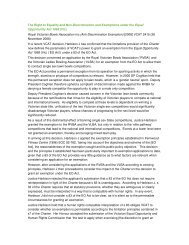
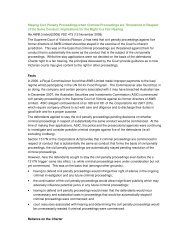
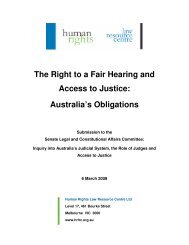
![Maslov v Austria [2008] ECHR - Human Rights Law Centre](https://img.yumpu.com/38882316/1/190x245/maslov-v-austria-2008-echr-human-rights-law-centre.jpg?quality=85)
![Kortel v Mirik [2008].pdf - Human Rights Law Centre](https://img.yumpu.com/38882257/1/190x245/kortel-v-mirik-2008pdf-human-rights-law-centre.jpg?quality=85)

